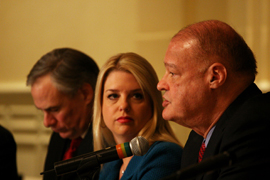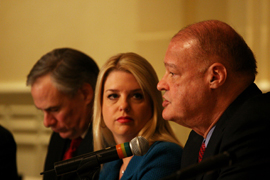Court blocks Arizona law against ‘harboring and transporting’ immigrants

Cronkite News
WASHINGTON – A federal appeals court Tuesday let stand an injunction against an Arizona law that would have made it a crime to harbor, shield, conceal or transport immigrants here illegally.
A three-judge panel of the 9th U.S. Circuit Court of Appeals not only upheld the injunction, it said parts of the law were “unintelligible” and conflicted with federal law.
Arizona Attorney General Tom Horne vowed to appeal the ruling, saying the state should be able to pass a law against transporting illegal immigrants, “especially in connection with committing a crime.”
“This is only a preliminary injunction – it’s not a final decision on the merits” of the case, Horne said.
But opponents of the law hailed the ruling.
“It’s a better day today in Arizona knowing that there is this clarity from the court of appeals,” said Omar Jadwat, the attorney for the American Civil Liberties Union’s Immigrants’ Rights Project who argued the case in the 9th Circuit.
The law, passed as a section of the SB 1070 immigration reform law, was in effect from July 2010 until September 2012, when a district court blocked it.
Isabel Garcia, co-chair of the Coalicion de Derechos Humanos in Tucson, said she was “gratified” with the decision. She said the Hispanic community has been under a “huge cloud of fear” since SB 1070 was passed.
“We’re really heartened that at least those provisions are, even though not permanently settled, at least for the meantime settled,” said Garcia, whose group was one of many plaintiffs in the suit.
The law makes it a misdemeanor to transport, conceal or harbor someone in this country illegally or to encourage someone to come here illegally. It rises to a felony if 10 or more immigrants are involved. The law applies to a person who is already “in violation of a criminal offense.”
Supporters say the law was aimed at human traffickers. But opponents said it could put others at risk for prosecution, people like Luz Santiago, a pastor in Mesa whose congregation is made up mainly of illegal immigrants and who was a plaintiff in the case.
The court sided with the law’s opponents.
“We do not believe that the text of the statute … has any substantive content that would make prosecution of Santiago any less likely,” Judge Richard Paez wrote in the opinion.
The court also said the language limiting the law to those in violation of a criminal offense was “nonsensical” and “has no discernible meaning.”
And it said the state law is pre-empted by federal law, which already outlaws transport of illegal immigrants, and did not offer “safe harbor” provisions allowed under federal law for “certain religious activities.”
Garcia, who is also an attorney, called the panel’s decision “a good barometer” of what the eventual outcome will be. Jadwat called it “almost impossible to imagine” how the decision on a permanent injunction would be any different.
“It’s enjoined now, it’s been enjoined since September of 2012 and our expectation is, in light of what the court of appeals did here, that it will continue to remain enjoined for all time,” he said. “Barring any further appeals by the state.”
But Horne said an appeal is likely.
“A three-judge panel has given its view,” Horne said. “We’re going to appeal to the entire 9th Circuit – we’re not backing down, we’re going to continue to press it.”
Gov. Jan Brewer believes the ruling is “misguided,” her spokesman said.
“The judges suggest that state and local law enforcement should not have the ability to combat criminal elements of illegal immigration, such as smuggling and harboring,” spokesman Andrew Wilder wrote in an email. “That defies common sense – and it’s not what Arizonans expect.”
The suit involved 20 individuals, unions, churches and community organizations who sued to block the law and more than 30 state officials, including virtually every county attorney and sheriff.
Jadwat said the fight against SB 1070 is not over, but that people can take “a fair amount of comfort” from Tuesday’s ruling, which limits some of the immigration law’s effects.
“Innocent interactions with fellow Arizonans aren’t something that’s going to get you into trouble because of people’s (immigration) status,” he said.















